The Telecommunication industry growth and its impact in Thailand telecommunication industry comes under the information & communication technology sector, which is made by Telephone companies/ Telecommunication and with internet service providers. It plays very significant role in the enlargement of information society and mainly in mobile communications. Tradition telephone calls providing industries are biggest revenue generators for any country; it should be done with the help of network technology. Telecom industry today growing like less voice and more text such as messaging & email and images for example (video streaming). High-speed internet for computer-based applications like broadband information services and some interactive entertainment is common nowadays. DSL (Digital Subscriber Line) is the important broadband telecom technology and the rapid growth coming from value added services which can be delivered in mobile networks. The telecom industry continues their innovation and growth compared to any industry in the world. Telecommunication is growing like world’s biggest machine with telephones, mobile phones, networks and with internet linked PCs and the telecommunication helps to share thoughts, speak to others, do business etc.
Business sector in Thailand:
Thailand is considered as second biggest Southeast Asia consumption market and it contains market of sixty million consumers. The consumption expenditures reach higher than half of GDP in Thailand’s and average households spending 50 percent for foods and Beverages along with retail consumption. There is strong CAGR for e-commerce, which has enhanced internet infrastructure, intense competition from much global e-commerce and high adoption cost for mobile internet. Food & Beverages companies and many Singapore retail seeing a good opportunity to come into the Thai market as a partner for multi-brand operators through a franchise or distribution mode, and by joint ventures. As food services and retails are prohibited sectors in Thailand.
Telecom infrastructure isn Thailand country:
The telecom industry has strong growth that has begun to moderate in a few years back. The mobile market nowadays playing a major role and its profits are more. While the country has attained considerable from a telecom sector, but there is still some work have to be completed on regulatory reform. TOT and CAT are the two state enterprises, and it was not yet clear that how government going to handle the reforms required in this regard. The government has planned to invest ten billion Baht in enhancing the nation’s telecom industry infrastructure in the part of its digital economy strategy. The government of Thailand has aimed to provide double the internet connection for forty million people, which can be implemented in the year 2018. Presently the telecommunication sectors are fully controlled by mobile communications and the growth in the industry of mobile remains strong compared to the fixed segment. Broadband network infrastructure growing quickly, but it will still insignificant
- Fixed line Network: In 2007, total line capacity for Thailand was 8.73 million and it was connected up to 7.2 million. The tele density range was 11.47 lines for 100 residents and in 2001, it was like 9.75 lines for 100 residents. The range of line was increased to 2.3% during the year of 2001 to 2006 and it is mainly due to the exponential growth in cellular mobile market service, there are presently three types of fixed line Service Company such as TOT corporation public, True corporation public and TT&T public company. In the year of 2007, TOT had a large share in fixed line service of the total market with the range of 57.73%. The second one is a True corporation, the public had the range of 25.84% share in the market and TT&T has the least share in the market at 16.43%. In metropolitan areas government of Thai providing only two services such as TOT & True and True holds the biggest market share by serving 52.37% of the metropolitan market. TT&T and TOT serve the leading position in provincial areas with the range of 67.78% and another most important player in fixed-line service network is CAT Telecom public, which is the exclusive international phone service provider in Thailand.
- Mobile Phone services: In the year of 2007 March, the total mobile subscriber was up to 43.5 million with the rate of 66 %. And the mobile market was enjoying the growth with an annual growth rate more than 80% in the year 2001 to 2006. Mobile service also has greatly enhanced in the rural areas, because it provides a large range of coverage. There are recently 6 mobile service operators in which, three services are large such as True, AIS (Advanced Info Services), DTAC (Total Access Communication. AIS is considered as the biggest market player with the share of 48.43% in the year on March 2007 and the second biggest market player is DTAC which contains the market share of 30.73% and the last one is True that contains the share range of 18.76%. AIS has enjoyed because of its largest market share, but it is also falling in present years. The mobile services are mainly concentrated into these three corporations that contain nearly 98 percent of total subscribers.
- Internet access: In the year 2007 June, there were fifty-nine licensed ISP (Internet service providers) and in 2006, nearly 2.4 million internet service provider subscribers contain the users around 8.4 million. The growth range of internet users in-between the year of 2005 to 2006 was nearly 13% and the largest internet service provider is True because of its high market share and it’s holding approximately one million subscribers. Broadband internet has the small length and its capacity of the subscriber is only 105,000 in 2006 but this broadband service growing rapidly. The number of customers getting higher compared to the number of subscribers, but official information is not available. True is the biggest broadband service provider and its internet users reached up to 442,728 in 2006, apart from True, there are many other broadband internet providers are available. Many service providers in Thailand are Telecommunication Company or their subsidiaries. The important player in Advanced Datanetwork Communications, True Corporation, TT&T and TOT. The two largest service providers are TOT & True in Bangkok and these services have their self-optical cable networks in the city of Bangkok. True has the biggest share in the market about 85% and it can be used by many people. It can be expecting that internet broadband will continue to increase the growth as cost goes down The potential and actual internet technologies such as 1) fiber optic cable, 2) broadband wireless access, 3) 3G and WiMAX technologies 4) ADSL.
Rules and institutional framework in Thailand:
The government made the policy to raise the service coverage in the telecommunication industry, mainly for internet access and fixed lines, and then they decided to divide between rural and urban areas. Liberalization of the sector is also a significant thing in the sector development and Telecom Master Plan has given an overall guide to the telecommunication development for the year 2005 -2007. The government strategy mainly focuses on five important facets of the telecommunication sector, such as e-commerce industry, e-industry, e-education industry, e-government industry and e-society industry. These industries will give a strong foundation in the development of the knowledge-based economy. Some measure also introduced to attain this goal is internet fee reduction, basic telephone service expansion, separation of affordable computers. Historically, the industry of telecommunication in the Thailand country was controlled by two owned enterprises are TOT and CAT, these both are service operators. NTC has the authorization to make the own policy and its function involves spectrum management, licenses, maintaining network connection and network usage, supervising the network and equipment standard, allocation radio frequency, ensuring fair competition, enforcing the law and consumer protection. In the year of 2007 August, NTC joined with NBC (National Broadcasting Commission) and these both combined, then formed independent regulatory body named as NBTC, that will take care of entire telecommunication industry including voice, frequency and content activities underneath one umbrella.
NTC has created some criteria for phone number allocation and temporary measures for frequency and radio allocation. The NTC has provided 6 telecommunication licenses for CAT and TOT and the licenses cover the current service bestowed by two operators and also NTC has provided many more licenses to some other infrastructure which are telecom service providers based. In 2007, NTC had given fourteen licenses for service provider below three types of telecommunication business license. The Obvious regulatory framework of internet service providers had been established which includes license fees, licensing criteria and interconnection charges. TOT and CAT had become corporate but now they are in public company status and their 100% shares are still controlled by the state.
Industry achievement and international comparison:
Both cellular and fixed is not a big issue for the telecom infrastructure development but fixed telephone lines outside the area of Bangkok is still less, the higher mobile service penetration rate filled the gap. Because of this, more people are moving to voice telecommunications services and rate of fixed telephone lines is 10.92 for 100 residents in 2006, but compare to the other countries the cost is lower still. Although the market of the mobile phone has been yielding rapid growth, but the cost is much lesser than their neighboring countries such as Singapore, Malaysia, Japan. Mobile has become a cost effective and effective thing for fixed telephone service and if the search for why the cost is low compared to other countries, gives the fact that owing to limited demand than inadequate supply.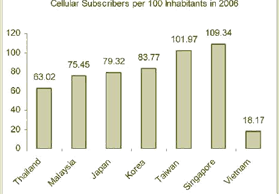
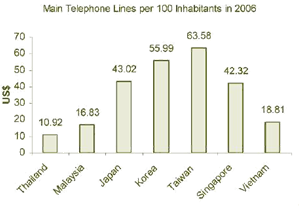
Thailand has affordable cost and competitive for telephone services and for local calls Thailand charging 3Bhat. There are lots of pricing schemes regarding mobile services for the consumer with several usage patterns. Comparison with other countries, it has the fewer costs for mobile services. In 2005, local call using cellular line was &0.05 but in Japan and Singapore had $ 0.52 and $0.14 respectively. For international calls, it has a higher tariff rate, but lesser than-than the country china. Because of recent government policy, the rate for international phone calls in TOT and CAT was reduced and international phone call through the internet also decreased for much lower rates. Thailand is in the position of the 49th among 55 countries in which people use the internet.
Mobile and Mobile Broadband Market in Thailand:
Mobile Market:
Market structure of Mobile: The mobile market operates under the main three private operators such as AIS, True and Dtac and their subsidiaries along with two state enterprises such as TOT and CAT. AIS group contains DPC (Digital Phone) and AWN (Advanced Wireless Network), Dtac contains DTN (Dtac Trinet) and Dtac and True contains TUC (True Universal communication),True Move and Real move, Which is MVN operator using CAT network.
Subscribers and Penetration Range: The mobile market is growing continually year by year and in the year 2015, nearly ninety crore subscriptions among these 85.8 percent are prepaid subscriptions and 14.2% are postpaid subscriptions. The perforation range of mobile service was 139% of the population and it will be increasing for upcoming years.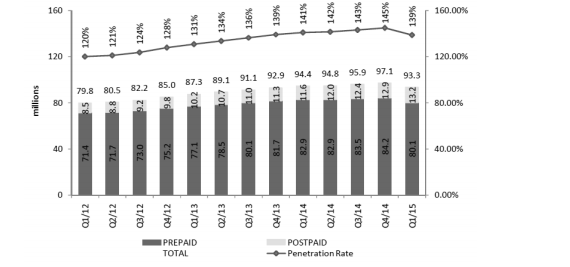
Revenue Breakdown: The mobile market revenue is categorized as voice, non-voice, and some other services. The Last four years, records show that the revenue of non-voice has been increasing continuously. Voice service in mobile market generated 44% profit and non-voice revenue was 40 percent and other services generated a profit of 15% in the year of 2015.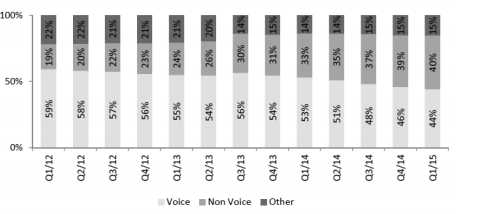
Bandwidth demand:
According to analysis, in the most developed economies, Wi-Fi traffic has grown faster than the mobile data during the last two years. This has been reported mainly by cable operators and fixed other than operator offload plan, but small cells can have enabled the operator to preserve and start to reverse the handset offloading to the service Wi-Fi at the end of 2018. In Thailand, Today’s broadband, the mobile market is starting a transformation from 2G-Gsm to 4G and beyond. Growth in 3G and 4G needed perfect planning for the spectrum holdings in an efficient way.
Broadband mobile market:
Subscribers: In 2005, AIS group has approximated twenty million broadband mobile subscribers that are equal to 49.1% of total AIS subscribers. DTAC has nearly 14.8 million broadband subscribers and these numbers are increasing continuously.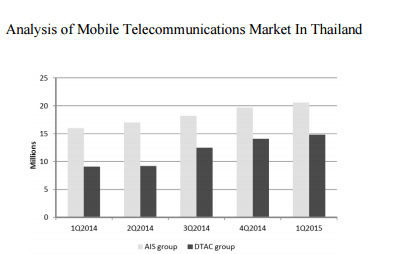
Price structures: Broadband mobile is growing rapidly with the help of NBTC and it has the range of 2.1 GHz. Most of the broadband strategy’s costs are according to the usage by the users rather than usage by time-based. In addition, it will be common to implement a FUP (Fair Usage Policy) for providers, where the purchased usage policy has been reached then the usage speed can be decreased. There are two types of cost plans such as Limited price plans and unlimited price plans. Limited price plans such as True’s it Net, it offers 499Bhat with the net range of 2GB per month and it has the speed range of 42Mbps. If the customer reaches more than 2GB then they will be charged according to their usage. Unlimited price plans involve True’s iNet, it provides 2GB with the price range of 599 Bhat pm with the 42 Mbps speed range. If the customer exceeds more than 2GB, they can continue the usage, but the speed will be reduced to 128Kbps. Nowadays competition is more in the market of broadband mobile. If any provider provides a new cost plan, then the other provider will do some similar or high plan value to retain their customers. In addition, every broadband company offering more discounts to increase their profits and to the growth of the broadband mobile market.
Data usage and consumption: In recent days, all people are changing their feature phones to the smartphones. In the year of 2014, there were nearly twenty million smartphone users in Thailand mostly all people have smartphones only a few people having the feature phones. IDC reported that consumption of mobile data will continue to increase rapidly and by 2020, the usage will reach 192,265 MB for one individual per month in comparison with 72,351 MB for one individual in 2015. In Upcoming year 2020, internet browsing will play as main activity type, because 2015 the usage is 25%, but it will increase more and more in forthcoming years. The consumer has a habit of using broadband mobile via tablets, handsets and also with dongles, a report tells that the data consumption via tablets/handset will reach up to 102,450 MB pm for one individual and the usage via dongles will hit 89,814 pm for one user. Despite the delay of 3G launch, Thailand developed well when compared to the other countries in Asia in terms of more smartphone usage. According to Mason’s analysis, the smartphone usage will increase up to 70-80% by the year 2019.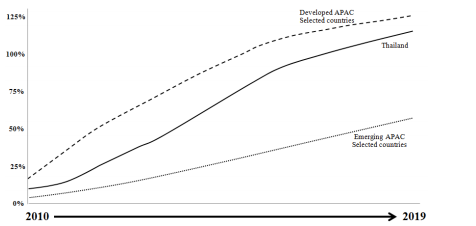
Conclusion:
The mobile market will play a vital role in Thailand economy, in recent years there may be lots of changes in the mobile market along with a gradual increase in data usage, which takes place in developed and emerging nations over the globe and the mobile industry making mobile data technology shift to 4G from 3G networks. 3G and 4G network is growing in a significant way and broadband mobile was booming also tablet and the smartphone market are running hot. The demand for internet related services began to rise, as proved by the expansion capacity of international bandwidth, but Thailand has lots of development at work to create an equal market standard with the other countries. In Thailand, they are expecting that the new broadband infrastructure will create an optimistic impact on jobs. This will provide positive changes among the people and Thailand will develop their skills and abilities to utilize the new infrastructure with latest emerging technologies.
Contact Startup in Thailand for professional startup consulting if you are contemplating to set up a business in Thailand.
Let the Startup Specialists handhold you for doing business in Thailand.
Interesting Reads :


